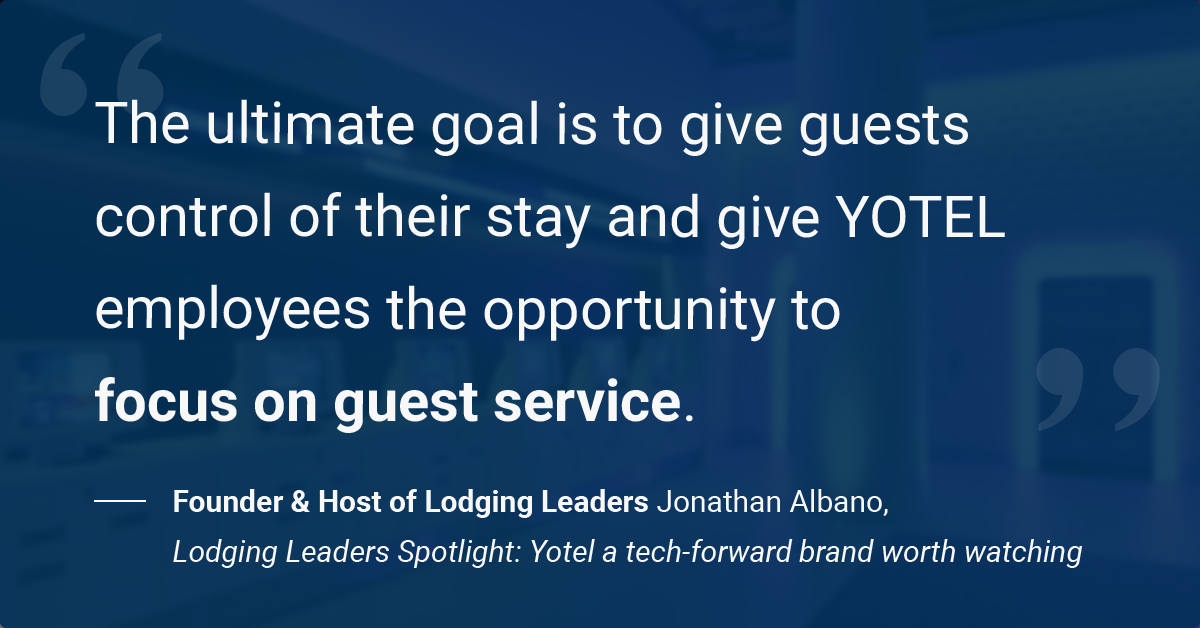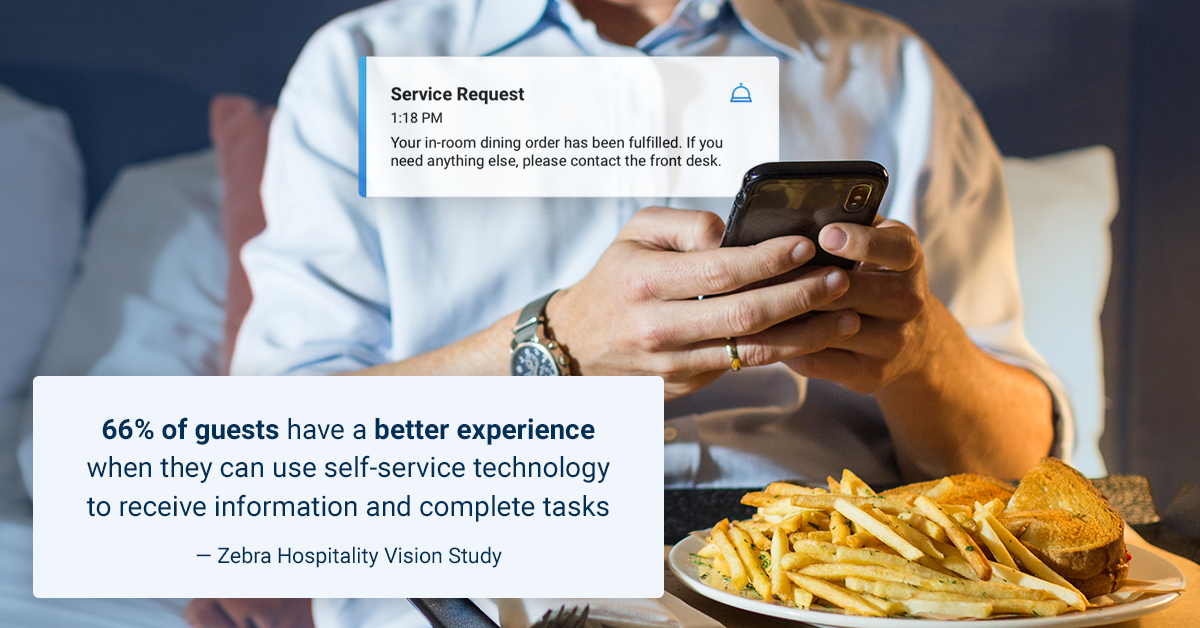This article was originally published on Hotel Tech Report on November 20, 2019.
Guests are increasingly interested in communicating with a hotel before, during, and after their stay via mobile apps for hotel management. They’re seeking an easy avenue to check-in remotely, explore amenities, and learn more about the property and surrounding neighborhood. Hotel apps are one way hotels have successfully met this growing guest expectation.
Intelligently integrating a hotel app within the guest experience allows your property to open a clear line of communication with guests. It’s a platform through which guests can access hotel information such as room services and amenities, check-in remotely, place service requests, book a spa service, and more. Mobile hotel apps increase guest engagement and provide a new channel for upselling ancillary services, ultimately improving the guest experience when deployed correctly.
Mobile app providers like INTELITY are leading the way in providing a thoughtful, tech-enabled guest experience. Here’s what you need to know about guest mobile apps to offer a great experience at your property.
Why use mobile apps for hotel management?
Today’s guest is mobile-first, meaning hotels must find a way to provide five-star service optimized for any device. The ability to book and edit reservations, order room service, learn about amenities and check-in remotely are all features that guests expect to manage through a hotel app. Some hotels have taken it a step further to add features that engage and surprise their guests further.
The core benefits that any hotel app must provide are the ability to increase revenue with ancillary offers; real-time marketing through targeted promotions sent through the app; and the capture of data to build guest loyalty through a tailored experience. Apps like INTELITY can do much more than provide these foundational benefits.
Great hotel apps centralize a guest’s digital experience through streamlined communication and messaging. An app should integrate with your guest messaging service and PMS to provide mobile check-in and facilitate other guest requests. The ability to skip the front desk reduces wait times and lobby traffic by 20%, which makes guests happier and frees up staff. Through INTELITY, guests enjoy easy and convenient access to staff via mobile messaging, and staff are more readily available to assist via the back-end dashboard.
Guest mobile apps reduce barriers between guests and the right on-site teams to resolve any issues as they arise and ensure requests get answered quickly. INTELITY’s guest messaging connects guests directly with operations teams through SMS, as well as in-app messaging services, like Facebook Messenger. All messages get routed through the INTELITY platform to make sure there are no missed connections. Whether it’s a request for late checkout, room service, or for extra towels, an app should be able to route these communications to the right team within your property.
And, most compellingly, the right hotel app can unlock new ways to increase guest spend. Send relevant offers through the app to capitalize on guest preferences. A great example is the James Hotels app, James Pocket Assistant. The app helps guests discover and access amenities and special offers on-site. Menus and other content are updated quickly depending on what’s happening at the hotel and guest preferences.
The changing market of hotel apps
This year, the hotel app market saw three big changes: the growth of internet of things hospitality, more personalization, and the introduction of artificial intelligence in the app experience.
IoT has taken the tech world by storm, and hotel apps are not exempt, Mobile apps now allow guests to customize their in-room experience. Lucy, the smartphone app of Virgin Hotels, has multiple features that allow guests to interact with the room. Lucy gives guests the power to adjust the room temperature, stream personal content to their room’s TV, and turn their smartphone into a remote.
Personalization options continue with the ability to map data across multiple guest touchpoints. Hotel apps can utilize smart learning mechanisms to personalize guests’ needs throughout their stay.
It’s important that any hotel app platform you decide to implement has an easy to use content management system so that you can make regular updates without contacting your vendor. INTELITY’s content management solution, for example, enables your team to update availability across food and beverage operations on-the-fly. Management can sync changes immediately across all channels: web app, in-room tablet, and mobile app, as well as send through discounts and promos in real-time.
And, lastly, artificial intelligence will be able to dissect and analyze guest interactions, behaviors, context and language to intelligently respond and provide a more personalized method of communication. Voice activation has become more common in consumer’s homes, and hotel rooms are likely to follow suit. Voice technology offers access to instant information about your hotel and the surrounding area, as well as answers to common questions that create a backlog at the front desk.
Next year, we predict more apps to enter the market, making it vital that hotel owners consider how their app will add unique value to the guest experience. The market will consolidate, as we’ve already seen with major players like Aimbridge and Interstate merging. And, the use of mobile keys will continue to drive app adoption – Hilton guests downloaded 7.6 million mobile keys through the app in 2018.
What should hoteliers look for in an app vendor?
An app needs to provide a holistic experience at the guest’s fingertips. Here are some of the key features your app must include:
- Mobile check-in: offer a frictionless way to skip the front desk while driving more revenue.
- Mobile key: keyless entry leads to an average increase of 7% in guest satisfaction scores.
- Guest messaging: SMS, Facebook Messenger, or and in-app messages to connect guests directly with your staff
- Room service ordering: automate service request delivery, track order status, track request fulfillment time, and generate data
- Loyalty program integrations: encourage increased engagement within your app between stays
- Local services and content: recommend local services and POIs to market your location and help guests maximize their stay
- Requests and ticket management: guests can make bookings with the concierge, arrange transportation or request more towels right from your hotel app
- Room automation: control the lights, TV, AC and drapes right from your phone
Broadly, your app must integrate with your PMS, IoT provider, and service optimization software. Your property management system should be equipped relay guest info to and from the app easily and allow for guests to check-in from their phone. Integrate the app capabilities with in-room technology to control features (lights, thermostat, etc.). And make sure you control traffic with a service optimization provider that can communicate guest requests efficiently and seamlessly to your staff.
Questions to ask hotel app providers
There are more app vendors entering the market each day. Learn more about what each provider offers and make sure they can answer these three questions:
- Do you build that can integrate with my hotel brand app? Hotel brands need access to a complete SDK to make app functionality live within their branded app.
- Does your app include mobile key? Mobile key is one of the most in-demand features of a hotel app. Make sure the app integrates with many industry-wide lock vendors and hardware partners to provide a seamless experience.
- Does your app integrate with my existing loyalty program? Integrate your loyalty program to drive higher ROI by encouraging loyalty members to download the application. Serve more targeted offerings to increase revenue uptake and remove friction between guests and their desired on-property services.
Find out what other hoteliers are saying about mobile apps and learn more about pricing in Hotel Tech Report’s 2020 Hotel App Buyers Guide.

